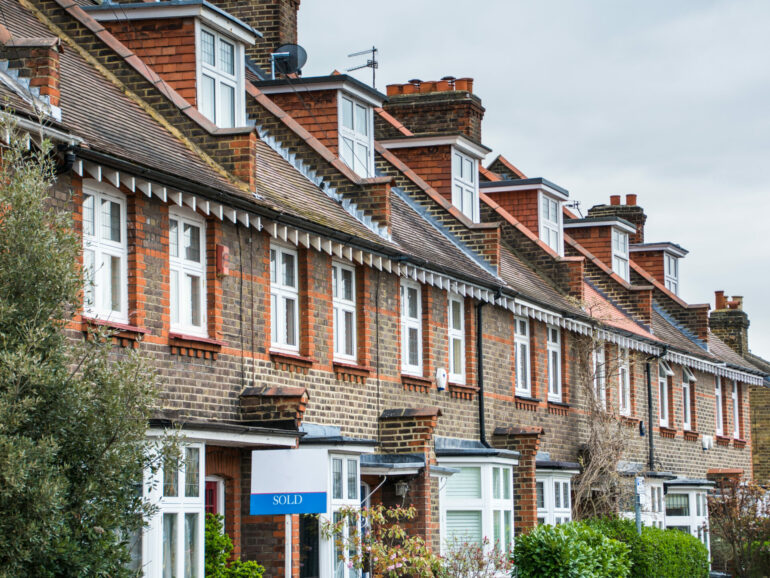Property professionals saw the number of house hunters and sales both fall in June but despite this house prices continued to grow, according to the Royal Institution of Chartered Surveyors (RICS).
Some 27% of professionals reported a fall in interest from potential buyers as numbers declined for the third month in a row.
But despite the slowdown in demand house prices continued to surge with 65% of professionals seeing an increase.
This was attributed to a lack of available properties for buyers to choose from, which is unlikely to shift drastically in the immediate future, RICS said.
However, house sales are expected to fall in the 12 months ahead. RICS said professionals are preparing for economic changes to have an impact, with many suggesting that the market is starting to cool off.
Looking at the competitiveness of the current market, half of survey participants reported that average sales prices are coming in above asking prices for properties listed at up to £500,000.
For properties priced between £500,000 and £1m, 39% are seeing the sales price beat the asking price.
For properties listed at over £1m, selling prices are typically coming in at slightly below the asking price on balance, the report said.
Rents
Rents are also expected to rise due to the continued imbalance between supply and demand, Rics said.
Some 36% of professionals reported an increase in tenant demand, while 11% saw a fall in the number of new landlord instructions.
52% predicted that rents will rise over the coming three months.
RICS chief economist, Simon Rubinsohn, said: “Although buyer inquiries have predictably slipped a little of late, this needs to be placed in the context of the healthy level of demand in previous months.
“A probably even more striking aspect of the latest report is the concern being voiced about the rental market.”
Reaction
Sarah Coles, senior personal finance analyst, Hargreaves Lansdown:
“The property market is coming off the boil, with demand falling again, supply flat, and sales slowing. A desperate lack of property available to buy is keeping prices rising, but the fire has gone out, so the latent heat in the market is cooling.
“Rising prices, the threat of higher interest rates, and now the uncertainty of the political landscape are finally taking a toll. The agent comments included some of the most negative predictions we have seen.
“The buyers are still there, but they’re increasingly cautious, and they’re keeping one eye on how bad things are going to get for them financially. As life gets tougher, more of them are pulling out of agreed sales and trying to negotiate a lower price.
“The lack of property for sale continues to drive prices higher overall, but the fall in demand is keeping a lid on it. It’s also making buyers more price-sensitive, so there’s more talk of overpriced properties going nowhere and sellers being forced to scale back their expectations. This is hitting particularly hard at the top of the market.
“Things could get even tougher as we go through the summer. GDP figures out yesterday came in above expectations, with the economy growing 0.5% in May. It has intensified speculation that not only will rates rise again in August, but they could be up 0.5 percentage points this time. And while existing owners are largely protected by fixed rate mortgages for now, new buyers are going to have to factor in higher borrowing costs. It may well be enough to blow a chill wind through the market, so any latent heat disappears even more quickly.
Renting
“The rental market remains red hot, and runaway rents continue to push costs up alarmingly for tenants. It’s yet another month when we’ve seen demand rise and supply fall, which is inflating rents alarmingly.
“Landlords are selling up, which is partly an effort to cash in on higher prices at the top of the market. However, overwhelmingly agents say they’re getting out of the business because of the increase in legislation. Several mentioned concerns about the white paper, published in mid-June, which is a vital step forward for tenants’ rights, but adds more responsibilities for landlords, and includes measures making it more difficult to raise rents. There’s a reasonable chance it could persuade even more to sell up.
“The legislation also makes it more difficult for landlords to end a tenancy. This is making them pickier about tenants, which means that anyone without a spotless rental record could find it increasingly difficult to find a home to rent at all. RICS is calling for the next prime minister to make life easier for landlords, in order to ensure enough of them remain in the business to keep a lid on rental costs.”
Tomer Aboody, director of property lender MT Finance:
“There are fewer buyers per property due to a less bullish feeling in the market as interest rate rises continue along with inflation.
“Goods, labour and materials are at such a high that anyone considering bidding for a property is taking into consideration any works required and offering less than they would have done previously.
“Although the numbers of buyers are lower, this is still high compared to previous years and therefore still pushing property prices to new highs due to lack of stock, although the pace of these rises has slowed.”
Jeremy Leaf, north London estate agent and a former RICS residential chairman:
“Clearly the property market is not immune from a 40-year-high in inflation and five successive increases in interest rates, which RICS confirms is reducing demand.
“However, we are still seeing considerable interest from buyers, particularly in smaller, correctly-priced family houses.
“Increasingly-stretched buyers are beginning to test the resolve of previously-intransigent sellers, which is resulting in some price softening but no major corrections so far.”

Emma Cox, MD of real estate at Shawbrook:
“Despite the cost-of-living crisis and the wider, challenging economic backdrop, demand for housing has remained remarkably resilient, which is reflected in record house prices in recent months.
“However, this, coupled with low stock levels and a lack of quality housing supply, mean a cooling of sorts is likely to occur in the near future. With further rate increases predicted over the coming months, property ownership is becoming a tougher aspiration for many prospective buyers.
“The UK is desperate for an influx of quality, affordable housing to help meet demand and restore a sense of balance to the market. Mortgage providers still have a strong appetite to lend to buyers, and it’s important for borrowers to carefully review the options on offer and consider locking in a deal that will shield them from future uncertainty.
“Stability in the long-term can only be achieved with a balanced market of quality, affordable, energy efficient properties. Government support is crucial to reaching that goal.”
Richard Rowntree, managing director, mortgages, Paragon Bank:
“The latest RICS Residential Market Survey highlights how demand for privately rented homes continues to exceed supply.
“Alongside an increase in landlord overheads, resulting from rising costs for energy, property maintenance and other essential items, this is placing upward pressure on rents with a net balance of +52% of survey respondents noting rises.
“Housing costs represent the biggest monthly outgoing for a substantial proportion of the population so any increase can have a significant impact on household finances at a time when many are already feeling the strain of the cost of living crisis.
“With a shortfall of social housing and homeownership becoming increasingly out of reach for many would-be first-time buyers, a healthy private rented sector is vital.
“Private investment is crucial for the sector to thrive so it is important that the industry supports landlords to respond to the challenge of tax and complex regulatory responsibilities.
“Alongside this, we must work closely with Government to ensure the voice of landlords is heard in conversations on future UK housing policy.”




